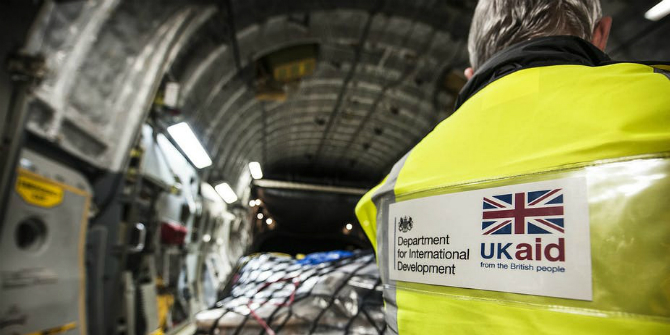 The EU is a significant partner for UK development objectives and UK aid represents an important proportion of the EU’s development budget. The UK spent £1.5 billion of its 2016 aid budget through the European Commission and European Development Fund. Does Brexit mean the UK fully withdraws from European international development efforts, and if so, how could that affect EU policy? Matt Jackson (UNFPA) explains.
The EU is a significant partner for UK development objectives and UK aid represents an important proportion of the EU’s development budget. The UK spent £1.5 billion of its 2016 aid budget through the European Commission and European Development Fund. Does Brexit mean the UK fully withdraws from European international development efforts, and if so, how could that affect EU policy? Matt Jackson (UNFPA) explains.
In the wider debates and analyses on the implications of the UK leaving the EU, comparatively little has been said about how the UK will restructure its foreign aid spend should it no longer support EU international development programmes – nor how UK withdrawal will affect the EU’s international development agenda to improve and save the lives of millions of people around the world living in poverty, marginalised from society, vulnerable to abuse or whose human rights are denied.
By way of background, the UK stands out as having enshrined in national law, and met, the UN target of providing 0.7% of gross national income for foreign aid – known as official development assistance (ODA). In 2016, this totalled £13.4 billion. DFID statistics show that the UK spent £1.5 billion of its 2016 aid budget through the European Commission and European Development Fund (EDF). Other ODA funds may also have been spent through bilateral EU programmes. This means a good proportion of the UK’s aid budget is spent, as with other multilateral organisations, through channels that pool funds from multiple donors to secure stronger purchasing power, scale up delivery, and achieve a sustained reach into poor communities.
In the UK’s December 2016 Multilateral Development Review, the European Commission’s Development (including EDF) and Humanitarian Assistance funds scored ‘very good’ on the match with UK development objectives, and ‘good’ on organisational strength. This gives the government confidence in achieving value for money. Brexit will reshape partnerships, but it is up to the government to decide whether to fully withdraw funding from EU development bodies, to continue to support EU programmes, or pursue a mixed approach based on the efficiencies and effectiveness of a long-term partner.
 Defence Images/flickr.com, CC BY-NC
Defence Images/flickr.com, CC BY-NC
So what can we expect?
The December 2017 report on phase 1 of Brexit negotiations says that the UK will honour its existing commitments and “remain party to the European Development Fund (EDF)…until the closure of the 11th EDF” in 2020. The government’s 2017 White Paper “The UK’s exit from and new partnership with the EU” states that “once the UK has left the EU decisions on how to use taxpayer’s money will be taken by the UK” leaving open whether or not to continue with contributions to EU development funds. On 23 August 2018 Dominic Raab, Secretary of State for Exiting the EU, said that the UK’s “No Deal” scenario planning commits to underwriting existing humanitarian programmes delivered by UK organisations until the end of 2020 in the event of the EU terminating all funding for UK-based NGOs after Brexit.
While these snippets of guidance leave a lot of questions unanswered, they may point to a transition phase until end 2020. Beyond that is unclear. In her recent trip to Africa, the Prime Minister announced a ‘fundamental shift’ in the UK’s aid budget to focus on long-term economic and security challenges, rather than short-term poverty reduction. This suggests a shake-up for the UK’s aid budget. Several aid Agencies are already asking whether UK Aid will continue to support direct efforts to reach the most vulnerable and most marginalised or whether it will be diverted to new activities.
What does this mean for the EU?
Not only is the EU a significant partner for UK development objectives, but UK Aid also represents an important proportion of the EU’s development budget. As with any change in political membership, the UK’s departure will invariably mean that EU priorities and strategic focus will shift. But which way will the dial turn? The UK has traditionally been a progressive voice, steering EU international development priorities towards efforts that raise ambition on tackling climate change, promote the rights and empowerment of women and girls, and support efforts to eradicate extreme poverty. Without the UK’s influence the remaining EU 27 Member States’ focus on issues such as renewable energy, and reproductive health and rights – key elements of the Sustainable Development Goals – may change.
Of course, any Brexit deal may retain the option for the UK to continue to fund results-based programmes beyond a transition period. But if not, will other EU Member States fill the UK-shaped hole in development budgets or will austerity measures set in?
Opportunities and Risks
UK withdrawal means UK policymakers will face choices in how to achieve their desired outcomes. There’s a real risk of duplication and reduced efficiencies if they get it wrong. But there is also an opportunity to design objectives that show leadership and which target under-served constituencies such as addressing the needs of adolescent girls in humanitarian settings. As other blogs in this series have said, the precise nature of Brexit remains unclear. This means that opportunities, risks, efficiencies and duplication are all possibilities on the international development horizon.
What’s clear is that the UK will need to redouble its efforts to remain an influential voice in international development policy, and ensure that any changes in future direction do not come at the expense of the most vulnerable and marginalised in societies, often women and girls. Eyes will be on the UK to test its commitment to ending global poverty and delivering the Sustainable Development Goals.
This post represents the views of the authors and not those of the Brexit blog, nor the LSE.
Matt Jackson is Director of the UK Office of UNFPA, the United Nations Population Fund.








I would hope that post Brexit there would be a presumption towards funding for development in Commonwealth countries, if only because we owe a moral debt towards former colonies. But also, if Commonwealth membership is to mean anything, then it is an important to have mechanisms for building internal relationships.